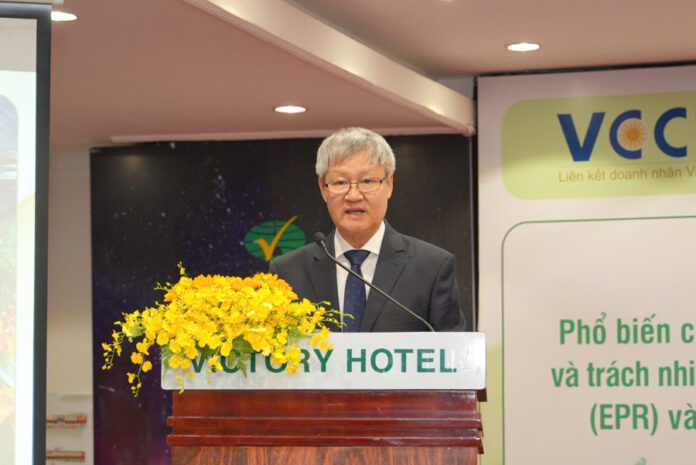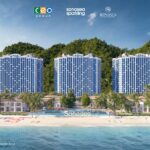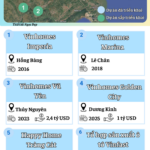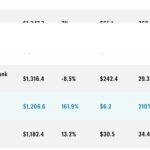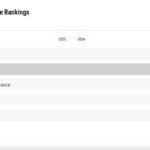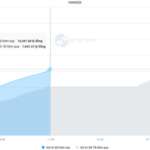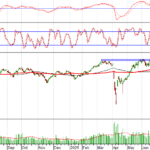On June 19, 2025, the Vietnam Business Council for Sustainable Development (VBCSD) under the Vietnam Chamber of Commerce and Industry (VCCI), in collaboration with the Ministry of Agriculture and Environment and the participation of HEINEKEN Vietnam, organized a workshop on “Propagating regulations on product and packaging recycling responsibilities and manufacturers’ and importers’ responsibilities for waste collection and treatment (EPR), and sharing good practices and discussions with businesses.”
IMPLEMENTATION OF EPR FACES MANY OBSTACLES
Speaking at the workshop, Mr. Vo Tan Thanh, Vice President of VCCI, shared that EPR has been effectively implemented in many countries. By 2025, over 60-70 countries have applied or are preparing to apply EPR. In the EU, EPR is mandatory for many product groups, with high recycling rates such as Germany achieving nearly 50% for plastic packaging – double the global average. South Korea and Japan are successful examples in Asia, with efficient and transparent recycling systems and coordinated efforts between the government, businesses, and citizens.
“These figures show that if designed and implemented effectively, EPR can not only reduce environmental pressure but also help businesses save costs, enhance competitiveness, and access environmentally conscious consumer markets,” emphasized Mr. Thanh.
In Vietnam, EPR has been institutionalized in the Law on Environmental Protection 2020, specified in Decree 08/2022/ND-CP, and recently in Decision 450/QD-BTNMT dated February 17, 2025. This is an important step in building modern environmental policies that approach international practices.

However, Mr. Thanh frankly assessed that the actual implementation process still faces many difficulties and obstacles. The infrastructure for waste collection and recycling is not yet complete, with the formal system still weak and the informal sector hard to manage. In addition, recycling costs are high, and recycled materials are difficult to consume domestically. Legal guidance is also lacking, causing confusion for businesses in choosing the form of implementation. There is a lack of monitoring mechanisms, limited enforcement capacity, and restricted communication.
Agreed with this view, Mr. Nguyen Hung Thinh, Deputy Director of the Environment Department, Ministry of Agriculture and Environment, said that the Law on Environmental Protection of 2020 marked a turning point in completing the EPR implementation mechanism, with clearer and more comprehensive regulations.
To specify the provisions of the Law on Environmental Protection of 2020, especially the new points related to the EPR policy, the Government has issued Decree No. 08/2022/ND-CP dated January 10, 2022, Decree No. 05/2025/ND-CP dated January 6, 2025. The Ministry of Natural Resources and Environment has also issued Circular No. 02/2022/TT-BTNMT dated January 10, 2022, and Circular No. 07/2025/TT-BTNMT dated February 28, 2025, detailing a number of articles of the Law on Environmental Protection. These legal documents have basically completed the legal framework for implementing EPR according to the Law on Environmental Protection of 2020.
However, according to Mr. Thinh, the practical implementation over the past time shows that EPR is a new policy with a wide scope and related to many groups of subjects such as manufacturing enterprises, importers, recycling enterprises,… While the access and understanding of the EPR regulations by a part of enterprises are still limited.
Currently, EPR contents are specified in several documents such as Decree No. 08/2022/ND-CP and Decree No. 05/2025/ND-CP, which makes it difficult to monitor, search, and implement consistently.
From a business perspective, Ms. Pham Thi Truc Thanh, Director of Sustainable Development of HEINEKEN Vietnam, shared that EPR is an important policy in promoting a circular economy. Along with the implementation of EPR, enterprises are strengthening cooperation with domestic and foreign partners to increase the use of recycled materials and gradually close the packaging loop.
However, the representative of HEINEKEN Vietnam pointed out that there are still many challenges as Vietnam lacks an effective waste collection infrastructure and advanced, high-quality recycling technology. This requires coordinated efforts in building and implementing the EPR policy to improve the waste collection rate, reduce resource loss, and promote closed-loop recycling.
NEED FOR A SEPARATE DECREE ON EPR
Given the above shortcomings, the participants agreed that the preparation and issuance of a separate Decree on EPR are necessary to concretize the implementation mechanism, address current problems, and create a clear and transparent legal corridor for businesses.
According to Mr. Thinh, to overcome the existing shortcomings, the Ministry of Agriculture and Environment has proactively proposed the development of a separate Decree detailing a number of articles of the Law on Environmental Protection on the responsibility of product and packaging recycling and the responsibility of manufacturers and importers for waste treatment.
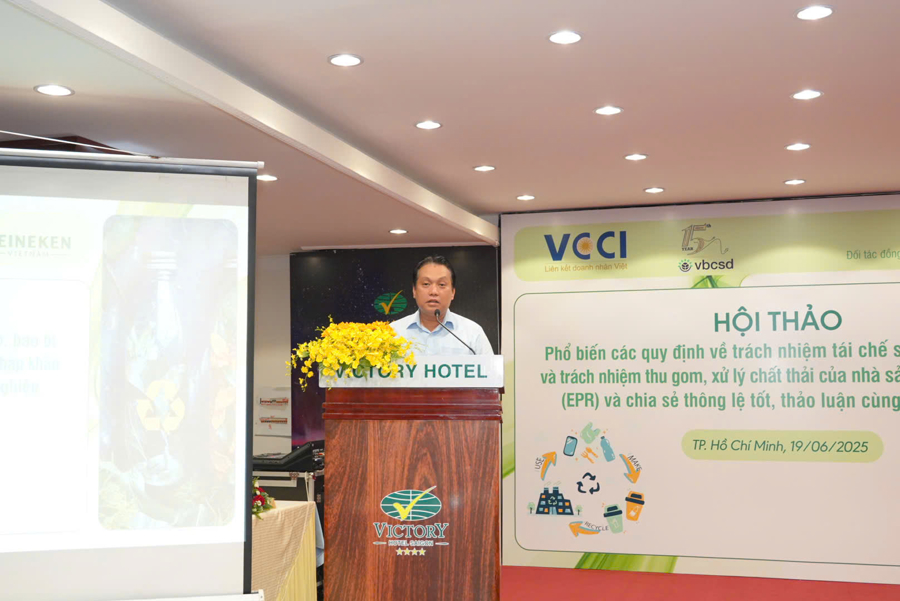
“The issuance of a separate decree on EPR is not only a technical solution to overcome the dispersion in the current legal system but also clarifies the regulations on the financial mechanism to support recycling and waste treatment, creating a transparent and feasible legal corridor that meets the practical requirements of environmental management in the new period,” emphasized Mr. Thinh.
At the same time, it demonstrates the clear commitment of the Vietnamese government in achieving sustainable development goals, reducing waste, promoting recycling, and using resources efficiently. This move is also in line with international practices, as many advanced countries such as South Korea, Taiwan, and others have separate and specialized legal documents for EPR, thus improving implementation effectiveness and transparency throughout the system.
In more detail, Mr. Thinh suggested that the draft Decree on EPR should be consistent with the provisions of the Law on Environmental Protection of 2020, especially Articles 54 and 55, on the responsibility of product and packaging recycling and the responsibility of manufacturers and importers for waste treatment.
“It is necessary to focus on clarifying whether the draft Decree has sufficient legal basis and fully reflects the content and spirit of the Law on Environmental Protection of 2020. Are the provisions feasible and suitable for practical implementation?” proposed Mr. Thinh.
Along with this, it is essential to carefully consider the new contents of the Decree, in addition to the inherited regulations in Decree 08/2022/ND-CP and Decree 05/2025/ND-CP, such as regulations on the disposal of means of transport; regulations on registration of recycling plans and reporting of recycling results; regulations on mandatory recycling rates and specifications, etc.
At the same time, it is necessary to research and propose an effective coordination mechanism to ensure the conditions for the organization of the implementation of the Decree, especially in the context of Vietnam’s gradual transformation of the growth model towards a circular economy, where EPR is a central and leading tool in this process.
The New Era of Second Homes: Profitable Vacationing at the Heart of Van Don
An oasis of relaxation and a profitable asset – that’s how the new generation of investors is defining the second home phenomenon. It’s no longer just about finding a place to unwind and rejuvenate; it’s about making a smart investment choice that blends personal experiences with long-term financial gains.
Tasco Makes the Cut in the Fortune Southeast Asia 500 List
“Tasco’s debut on the Fortune Southeast Asia 500 list is a testament to its remarkable growth trajectory over the past year. The company’s inclusion in this prestigious ranking highlights its position as a prominent player in the region’s business landscape, showcasing its resilience and ability to thrive amidst challenges.”
“GELEX Ranks Among Top 500 Largest Enterprises in Southeast Asia in 2025”
Fortune Magazine unveiled its 2025 Southeast Asia 500 rankings, and GELEX Group (HoSE: GEX) has secured a remarkable position at 217 among the top 500 companies in Southeast Asia.


























